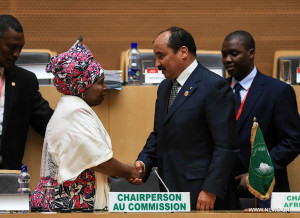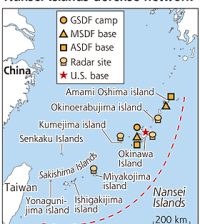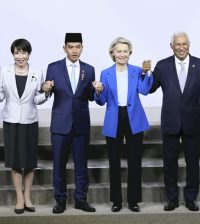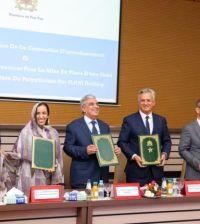- Washington “follows with interest” Morocco’s openness onto Africa (John Kerry)Posted 12 years ago
- The trial of South African Paralympic champion Oscar Pistorius opened in Pretoria on Monday.Posted 12 years ago
- USA welcomes efforts of King Mohammed VI in MaliPosted 12 years ago
- Egypt’s population reaches 94 millionPosted 12 years ago
- Mugabe celebrates his 90thPosted 12 years ago
- Moroccan Monarch to Build a Perinatal Clinic in BamakoPosted 12 years ago
- King Mohammed VI handed a donation of bovine semen for the benefit of Malian breeders.Posted 12 years ago
- Moroccan King’s strategic tour to Africa: Strengthening the will of pan African Solidarity and stimulating the south-south cooperation mechanisms over the continentPosted 13 years ago
- Senior al-Qaida leader killed in AlgeriaPosted 13 years ago
- Libya: The trial of former Prime Minister al-Baghdadi AliPosted 13 years ago
22nd AU summit ends with commitment of agricultural transformation, regional peace
 The 22nd African Union (AU) Summit concluded at AU’s headquarters in Ethiopia’s capital city of Addis Ababa on Saturday, with commitment of transforming agriculture and restoring regional peace.
The 22nd African Union (AU) Summit concluded at AU’s headquarters in Ethiopia’s capital city of Addis Ababa on Saturday, with commitment of transforming agriculture and restoring regional peace.
“The transformation of agriculture holds the key to the success of our collective efforts to realize our vision,” said Hailemariam Dessalegnthe, former Chairperson of the AU while addressing the opening ceremony of the summit themed “Agriculture and Food Security”.
The former chairperson also said progress has been made over the past decade in Africa’s agriculture and it’s time to renew the commitment to do more in the sector.
PRIRITY TO AGRICULTURAL TRANSFORMATION
We need to improve human resources for agricultural infrastructure and research that would contribute to boost productivity on the African continent, said Nkosazana Dlamini-Zuma, Chairperson of the AU Commission at the summit.
During the summit, agricultural development and transformation in Africa has been high on the agenda
Zuma also noted that Africa has yet to exploit its arable land while other continents have almost exhausted their arable lands. “The agriculture sector should be an engine for industrialization on the continent,” she added.
Africa needs to transform its agriculture in order to improve agricultural development and food security, said Tumusiime Rhoda Peace, Commissioner for Rural Economy and Agriculture at the AU Commission.
However, due to inadequate funding, poor rural infrastructure and neglected agricultural research, the continent experiences some challenges in fully exploiting its potential to increase food and agricultural production.
Our countries should combine efforts in order to increase cultivated areas and improve productivity through the modernization of rural infrastructure, the promotion of agricultural research and popularization of the most efficient farming techniques, said Mohamed Ould Abdel Aziz, the newly- elected chairperson of AU, who is also the president of Mauritania.
IMPLEMENTATION OF CAADP
Another theme for this year’s AU summit is to mark the tenth anniversary of the Comprehensive Africa Agriculture Development Program (CAADP)
In 2003, leaders of AU member states signed the CAADP under the auspices of the AU and the New Partnership for Africa’s Development, with hopes of developing Africa’s agriculture and eradicating hunger.
CAADP is a pan-African framework for revitalizing agriculture, food security and nutrition, which aims to assist African countries to reach a higher path of economic growth through agriculture-led development.
Under this comprehensive program, African governments have made a commitment to allocate at least 10 percent of their national budgets to the agricultural sector each year.
As of the end of 2013, over 20 African countries have signed the CAADP, which also brings hope to the future agricultural development.
Member states must fully implement the CAADP to unlock agricultural growth in Africa, said Maurice Lorka, senior CAADP adviser.
Africa also needs to attract more investment in order to boost its agricultural transformation and come up with feasible plans to eradicate hunger, he added.
EFFORTS TO RESTORE REGIONAL PEACE
Other discussions during the 54-member bloc’s biannual meeting focused on Central African Republic (CAR), South Sudan and Mali.
AU’s Peace and Security Council on Wednesday discussed the crisis in CAR and examined the latest development in the political transition of the country.
CAR has erupted into conflict since resigned former rebel leader Michel Djotodia ousted President Francois Bozize after a coup in March and named himself as the first Muslim leader in the majority Christian country.
Currently, some 4,400 African MISCA peacekeeping force and 1, 600 French soldiers have been deployed to the CAR to try to restore order in the impoverished country.
Continuing violence and insecurity in the landlocked country has displaced over one million people, about 20 percent of the country’s total population, and left about two million in need of humanitarian aid.
On Dec. 20, members of a national transitional parliament chose the female mayor of Central African Republic’s capital Bangui Catherine Samba-Panza as interim leader, with the hope of leading the country out of chaos.
Given complicated and fickle situations in the country, the newly elected chairperson also expressed his opinions on CAR during the summit.
The launching of process of transition shall help restore peace and security in CAR, said Mohamed Ould Abdel Aziz, adding that he welcomed the decision.
Latest move of the international society to assist CAR’s peace restoration came from the European Union.
The EU Commissioner for Development, Andris Piebalgs, announced Friday that the European Commission is ready to give new support in the range of 25 million euros (About 34 million U.S. Dollars ) to the African Union-led operation in the Central African Republic.
As for South Sudan, the Intergovernmental Authority on Development (IGAD) mediation team on Friday urged the warring parties to respect and expeditiously implement the cessation of hostilities agreement after reports of sporadic fighting in the country.
South Sudan has been in turmoil since mid-December after forces loyal to President Salva Kiir started to fight against rebel groups headed by sacked Vice-president Riek Machar, who is also an experienced guerrilla fighter.
On Jan. 23, South Sudan’s warring parties signed a ceasefire agreement in Addis Ababa, which was seed as progress after weeks of mediation talks.
However, it remains unclear how much the member countries can do to solve the crises.
For the unrest country Mali, AU High Level Representative to Mali and the Sahel, Pierre Buyoya, told a press briefing held on Wednesday during the summit that the continental bloc’s efforts were now focused on helping the west African country to consolidate peace and respond to development challenges it is facing.
“We are now supporting Mali in terms of emerging from the crisis and contributing towards its response to challenges on development,” said Buyoya, who is also former President of Burundi.




